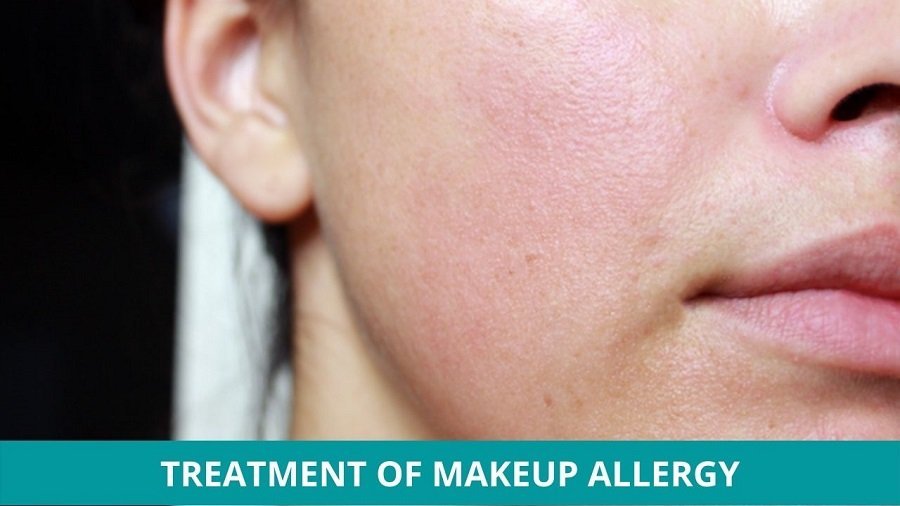As an Amazon Associate, I may earn a commission from qualifying purchases. Please note that you are never charged any extra for that.
The most common makeup allergy is to fragrances and preservatives. Fragrances can cause irritation, redness, and itching on the skin.
Preservatives, such as parabens, can also cause allergic reactions such as redness, swelling, and blistering. It is important to read the label carefully and avoid the use of products that contain these ingredients if you have sensitive skin. Consulting with a dermatologist is recommended to determine if you have an allergy or sensitivity to any specific ingredients.
Makeup is a part of many people’s daily routine, but sometimes it can cause more harm than good. Allergies to makeup products are very common and can manifest in a variety of symptoms, ranging from mild irritation to severe reactions. The most common makeup allergy triggers are fragrances and preservatives. Fragrances can cause itching and redness on the skin, while preservatives like parabens can cause blistering and swelling. Women with sensitive skin are at a higher risk of developing makeup allergies. It is important to be conscious of the ingredients in your makeup products and to consult with a dermatologist if you suspect an allergy to any specific ingredient.

Credit: www.iafaforallergy.com
Table of Contents
Understanding Makeup Allergies
Makeup allergies are a common problem among beauty enthusiasts. These allergies occur as a result of an immune response to certain ingredients found in cosmetics. Symptoms can range from mild to severe, including itching, redness, and swelling. In some cases, makeup allergies can even cause anaphylaxis, a severe and potentially life-threatening allergic reaction.
The most common allergens found in makeup include fragrances, preservatives, and certain dyes. It’s important to be aware of the ingredients in the products you use and to patch test new products before applying them to your face. If you experience an allergic reaction, it’s best to stop using the product immediately and seek medical attention if symptoms persist.
With proper precautions, you can enjoy the benefits of makeup without the risk of allergies.
Identifying The Most Common Makeup Allergy
Makeup allergies are common, with several culprits. Popular products include lipstick, foundation, and eyeliner. Common ingredients include fragrances, preservatives, and colorants. It is possible to develop an allergy to makeup at any time. Symptoms might include redness, itching, and swelling.
Patch testing might help determine the cause. If there are symptoms, stop using the product immediately. Do not mix up symptoms with the makeup application itself. Be aware of the products and ingredients that cause reactions. Be wary while trying new brands and products.
Check out the ingredients before making a purchase to avoid a severe allergic reaction.
Risk Factors For Makeup Allergies
Makeup is a staple in many people’s daily routines, but it can also cause allergies. Pre-existing allergies and sensitivities can increase the risk of a makeup allergy. Skin conditions and health problems, such as eczema and rosacea, may also heighten the risk.
Age, gender, and other demographic factors can play a role. It’s important to read product labels and do patch tests before using a new makeup product. If you suspect a makeup allergy, stop using the product and consult a doctor.
Knowing your risk factors for makeup allergies and being cautious when using new products can help prevent an allergic reaction.
Prevention And Management Of Makeup Allergies
Makeup allergies can be a nuisance for many people. To avoid them, try to use natural/organic makeup options. These products are free from chemicals and synthetic ingredients. If the allergy persists, consult a medical professional for treatment options. With the right medication, makeup allergies can be managed effectively.
It’s important to remember that prevention is always better than cure. So, before purchasing any cosmetic product, read the label carefully and look out for any potential allergens. By taking these simple steps, you can avoid makeup allergies and enjoy your beauty routine without any stress.
Frequently Asked Questions On What Is The Most Common Makeup Allergy?
What Makeup Ingredients Cause Allergies?
Common makeup allergens include fragrances, preservatives, and certain dyes such as red and yellow.
Can Makeup Allergies Be Prevented?
Avoiding known allergens and performing patch tests before using new products is the best prevention.
How Do I Know If I’M Allergic To Makeup?
If you experience itching, redness, swelling, or a rash after applying makeup, you may be allergic.
What Are The Most Common Makeup Allergies?
Fragrances and preservatives are the most common allergens found in makeup products.
Are Natural Makeup Products Less Allergenic?
Not necessarily. Even natural ingredients can cause allergic reactions in some people.
What Should I Do If I Have A Makeup Allergy?
Stop using the product immediately and consult a dermatologist if the symptoms worsen or persist.
Can Makeup Allergy Symptoms Get Worse Over Time?
Yes, repeated exposure to an allergen can cause symptoms to worsen with each subsequent exposure.
Conclusion
Understanding the most common makeup allergies and their causes is vital for anyone using cosmetic products. The symptoms of a makeup allergy can range from mild irritation to severe and even life-threatening reactions. Therefore, it’s essential to identify the root cause of the allergy and avoid using products that contain the allergen.
With the help of a healthcare professional, people can get an allergen test to determine specific allergies, and then they should only use hypoallergenic makeup products. Being cautious while using cosmetics, reading labels, and avoiding trends that expose one’s skin to potential allergens is also crucial.
Lastly, being mindful of proper makeup application techniques can prevent irritation and minimize the risk of developing an allergy. Overall, the goal is to enjoy the beauty benefits of makeup without compromising one’s health or risking allergic reactions.
Leave a Reply